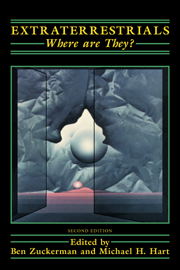Book contents
- Frontmatter
- Contents
- Preface to the Second Edition
- Preface to the First Edition
- 1 An Explanation for the Absence of Extraterrestrials on Earth
- 2 One Attempt to Find Where They Are: NASA's High Resolution Microwave Survey
- 3 An Examination of Claims that Extraterrestrial Visitors to Earth Are Being Observed
- 4 The Likelihood of Interstellar Colonization, and the Absence of Its Evidence
- 5 Pre-emption of the Galaxy by the First Advanced Civilization
- 6 Stellar Evolution: Motivation for Mass Interstellar Migrations
- 7 Interstellar Propulsion Systems
- 8 Interstellar Travel: A Review
- 9 Settlements in Space, and Interstellar Travel
- 10 Terraforming
- 11 Estimates of Expansion Timescales
- 12 A Search for Tritium Sources in Our Solar System May Reveal the Presence of Space Probes from Other Stellar Systems
- 13 Primordial Organic Cosmochemistry
- 14 Chance and the Origin of Life
- 15 The RNA World: Life before DNA and Protein
- 16 The Search for Extraterrestrial Intelligence
- 17 Alone in a Crowded Universe
- 18 Possible Forms of Life in Environments Very Different from the Earth
- 19 Cosmological SETI Frequency Standards
- 20 Galactic Chemical Evolution: Implications for the Existence of Habitable Planets
- 21 The Frequency of Planetary Systems in the Galaxy
- 22 Atmospheric Evolution, the Drake Equation and DNA: Sparse Life in an Infinite Universe
- About the Editors and Contributors
- Author Index
- Subject Index
10 - Terraforming
Published online by Cambridge University Press: 20 October 2009
- Frontmatter
- Contents
- Preface to the Second Edition
- Preface to the First Edition
- 1 An Explanation for the Absence of Extraterrestrials on Earth
- 2 One Attempt to Find Where They Are: NASA's High Resolution Microwave Survey
- 3 An Examination of Claims that Extraterrestrial Visitors to Earth Are Being Observed
- 4 The Likelihood of Interstellar Colonization, and the Absence of Its Evidence
- 5 Pre-emption of the Galaxy by the First Advanced Civilization
- 6 Stellar Evolution: Motivation for Mass Interstellar Migrations
- 7 Interstellar Propulsion Systems
- 8 Interstellar Travel: A Review
- 9 Settlements in Space, and Interstellar Travel
- 10 Terraforming
- 11 Estimates of Expansion Timescales
- 12 A Search for Tritium Sources in Our Solar System May Reveal the Presence of Space Probes from Other Stellar Systems
- 13 Primordial Organic Cosmochemistry
- 14 Chance and the Origin of Life
- 15 The RNA World: Life before DNA and Protein
- 16 The Search for Extraterrestrial Intelligence
- 17 Alone in a Crowded Universe
- 18 Possible Forms of Life in Environments Very Different from the Earth
- 19 Cosmological SETI Frequency Standards
- 20 Galactic Chemical Evolution: Implications for the Existence of Habitable Planets
- 21 The Frequency of Planetary Systems in the Galaxy
- 22 Atmospheric Evolution, the Drake Equation and DNA: Sparse Life in an Infinite Universe
- About the Editors and Contributors
- Author Index
- Subject Index
Summary
Earth is unique in this solar system – it is the only planet that seems to support life. Its hospitable ecosphere stands in stark contrast to the empty, lifeless landscapes of the Moon, Mars, Venus, Mercury and other worlds probed by our spacecraft. Recent arguments suggest that while planets may be common in the universe, habitable worlds may not be. Internally, a candidate planet's proper composition, tectonic dynamics and very narrow but extremely long-period thermal stability may be rare. External biosphere-destroying natural processes, from interstellar dust clouds to sterilizing radiation sources, may periodically rid vast regions of a galaxy of planet-bound life forms.
Such a severe limitation on life-supporting worlds significantly impacts discussions of the Search for Extraterrestrial Intelligence at both ends of the question, the search for causes and the search for consequences. On the former issue, it seriously reduces the stage on which the formation and evolution of life may take its chances against the odds: few candidate planets means even fewer ultimate successes. At the other end of the question, it suggests strategies for searching for the few successful technologies that do evolve, by identifying potential technological activities they would choose to engage in, activities that may have very long range of detectability. The significance to human searches for ETI may be profound.
The issues of ‘probability of intelligence arising’ are dealt with in other chapters. My purpose is to address the question of final consequences.
- Type
- Chapter
- Information
- ExtraterrestrialsWhere Are They?, pp. 86 - 91Publisher: Cambridge University PressPrint publication year: 1995



